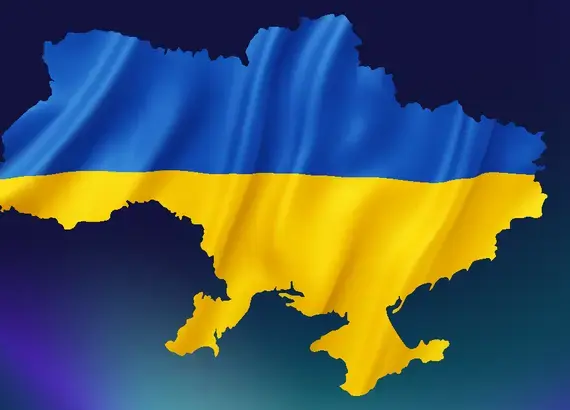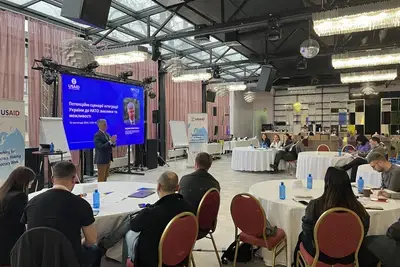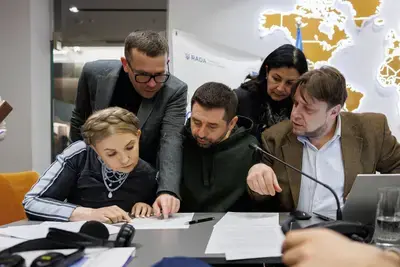
Success Story
Ukraine's Views on the War and Its Future
Ten years ago, Ukraine surprised many when thousands braved police violence on Kyiv’s streets to protest their corrupt, pro-Russian president. A decade after the “Revolution of Dignity” and almost two years into Russia’s full-scale military assault, a recent poll from the National Democratic Institute (NDI) shows Ukrainians continue to surprise. The data shows that even in the face of a devastating war that is about to enter its third year, Ukrainians seek a fully consolidated democracy, membership in Euro-Atlantic institutions, and a society based on human rights and the rule of law.
First, behind the hot-button issue of corruption lurk some surprises. Reporting on corruption in Ukraine often focuses on gaps rather than what has been accomplished. A close analysis reveals a different picture. According to NDI’s poll, Ukrainians are deeply aware of the need to tackle corruption, with 90 percent seeing corruption as a threat to their way of life. What’s more, when asked about the most important attributes of a democracy, 67 percent named equal justice for all, making it the most popular response. In the Ukrainian context, this concept is associated with bringing high-level corrupt officials to justice. This commitment is evident in the quantity and quality of anti-corruption efforts currently underway in Ukraine: day in and day out, Ukrainians are passing legislation, monitoring spending and launching criminal cases against corrupt actors, all while fighting a devastating war with a traumatized and shrinking population. In fact, in its detailed November 2023 analysis of democratic progress, the European Commission attested to Ukraine’s significant progress in fighting corruption.
Second, while Ukrainians remain hopeful, they are also realistic. Optimism about Ukraine’s future, as well as support for the military and key leaders, remains high. However, there is growing recognition that the war will be long and costly. As a result, respondents increasingly support a negotiated end to the war. The percentage supporting negotiations has increased from 29 percent in January 2023 to 42 percent in November 2023. That said, sizable majorities are unwilling to exchange for peace, either large swaths of Ukrainian territory or ties to NATO and the EU. Putin’s government has shown no signs of willingness to discuss compromise on either issue.
In a similar vein, Ukrainians understand that their ambitions to join NATO and the European Union will not be quickly fulfilled. In contrast with the beginning of the war, when a majority believed that Ukraine would become a member state within a year or two, 62 percent of Ukrainians currently believe it will take the country up to five years or longer to become an EU member state. This revised timeline is more in line with a typical EU accession process.
Third, Ukrainians are not naive about their relationships with the international community or the threats that they face. Nearly 90 percent report concern about waning international support for Ukraine. NDI’s survey respondents also identified internal societal divisions and Russian disinformation as significant risks. With support from a diversity of international donors and partnerships with individuals and organizations across the Ukrainian government and civil society, NDI programming directly addresses these threats, fostering transparency and good governance, promoting social cohesion, and strengthening institutional and public efforts to identify and combat disinformation from Russian and other sources.
Fourth, contrary to what he may have hoped, Putin’s aggression has continued to unite Ukrainians in their determination to reject dictatorship and move toward Europe. Prior to the full-scale invasion, NDI’s polls demonstrated differences in public opinion on joining NATO between the more Russian-speaking regions to the south and east and the rest of Ukraine. Two years later, those differences have vanished: today, 89 percent of all respondents across Ukraine want to see their country join NATO. Support for EU membership is even higher at 91 percent.
It would be a mistake to assume that this figure reflects only a desire for economic and military support. NDI’s polling points to a deeper motive: Ukrainians’ deep and genuine affinity with democratic and European values. In the latest poll, 93 percent agreed on the need to become a fully functioning democracy, a near-record number in NDI’s public opinion research. Perhaps most telling are Ukrainians’ changing views on equality and tolerance. In the poll, 60 percent see women’s military participation - which is the highest in any European army - as a positive sign of women’s changing role in society, and 67 percent say it increases the country’s military capacities. 72 percent of Ukrainians want LGBTQI individuals to enjoy the same rights as everyone else, up from just 28 percent four years ago.
This commitment to democracy is all the more incredible given the enormous price that Ukrainians have paid–and continue to pay–to realize the dream of a democratic Ukraine. Almost half of respondents reported having a friend or family member killed, and 43 percent have been separated from their families (not even counting the over 30,000 children who have been kidnapped from their parents and deported to Russia). More than half the population is suffering from sleep deprivation due to the relentless Russian air raids, and two-thirds report a deterioration of their mental health, while 56 percent have been physically harmed.
Ukrainians’ resilience in the face of these challenges speaks to the depth of their commitment to democratic values. Putin’s vision of a Ukraine subsumed in an autocratic Russia could not be more out of touch with what Ukrainians want. Which vision of Ukraine’s future is realized will depend, in no small part, on assuaging one of Ukrainians’ greatest concerns: maintaining support from international allies.
This research is funded by the United States Agency for International Development (USAID), Sweden, UK Aid and Global Affairs Canada Cette étude est financée par l'Agence des États-Unis pour le développement international (USAID), la Suède, UK Aid et Affaires mondiales Canada.
Related Resources:



